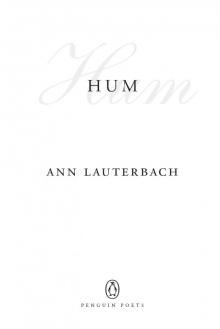Read Hum Storyline:
From Hum: Things are incidental Someone is weeping I weep for the incidental The days are beautiful Tomorrow was yesterday The days are beautiful Since the mid-1970s, Ann Lauterbach has explored the ways in which language simultaneously captures and forfeits our experience. In Hum, her seventh collection of poetry, loss and the unexpected (the title poem was written directly in response to witnessing the events of 9/11) play against the reassurances of repetition and narrative story. By turns elegant, fierce, and sensuous, her musically charged poems move from the pictorial or imagistic to a heightened sense of the aural or musical in order to depict the world humming with vibrations of every kind from every source—the world as a form of life. From Publishers Weekly"Maybe what is interesting will also be beautiful," writes Lauterbach at the opening of her seventh collection of poems, knowingly marking out a world that exists after beauty, after emotion, after nature—after everything that traditionally makes poetry. Her speaker is determined to make the absence of beauty beautiful without being postmodern; the poems are abstract and slippery, and yield their meanings with reluctant late modernist grace. The book is organized into three sections, the first attending chiefly to sound, the second to visual art, the third to 9/11. The poems limn a space somewhere between the world-as-given and the ideal, concentrating on language's dual relationship to experience, "[a]s if 'life' could touch its metaphors." The title poem addresses 9/11 in a series of simple declarative sentences, which repeat at intervals: "The days are beautiful./ The towers are yesterday." A poem about a Malevich painting argues for abstraction always derived from the concrete: "the square was only/ a boy with his knapsack/ a woman crossing his path." When her speaker, at intervals, simply gives it up ("I'm lonely for the integrity of sacred life, not religion, but love's/ trove, its coil around sex"), the hum of this book becomes a chorus of angels. (Apr.)Copyright © Reed Business Information, a division of Reed Elsevier Inc. All rights reserved. From BooklistA new book of poems and an essay collection showcase the subtle and philosophical work of a rarefied yet captivating poet.In Hum, Lauterbach taps into both the sensual and the cerebral aspects of consciousness. Her exquisite lyric poems are like lacework, netting feeling and thought, and embodying the inner flickering of light and dark, presence and absence. As Lauterbach gambols between sense and sensibility, elusiveness and lucidity, she sketches a poetic universe similar in topography and weather to that of Stevens and Ashbery. She meditates on the music of Mahler and the art of Botticelli and Gerhard Richter, and, like a particle accelerator, her whirling poems atomize experience. In her most focused and moving poems, Lauterbach, like so many writers, including Jorie Graham in Overlord (2005), traces the concussive emotional effects of 9/11. The nimble and glimmering essays in The Night Sky offer many insights into Lauterbach's life and poetics. She writes of her journalist father's early death. She muses on the nature of myth, and the difference between information and knowledge. She does write of stars and constellations and the dark, but for all the wonder of the sensuous, she confides that for many poets "language is the material of the world." It is a pleasure to see the forthright and communal side of Lauterbach, the side, one imagines, that inspires her to teach; the source, too, of her gracefully articulate arguments on behalf of poetry and all of art. And how perceptively she marvels over the vitality of today's poetry in spite of its utter neglect by society-at-large, and how eloquently she concludes that art is crucial to living a "life well spent" and to the well-being of a democratic society. Donna SeamanCopyright © American Library Association. All rights reservedPages of Hum :
